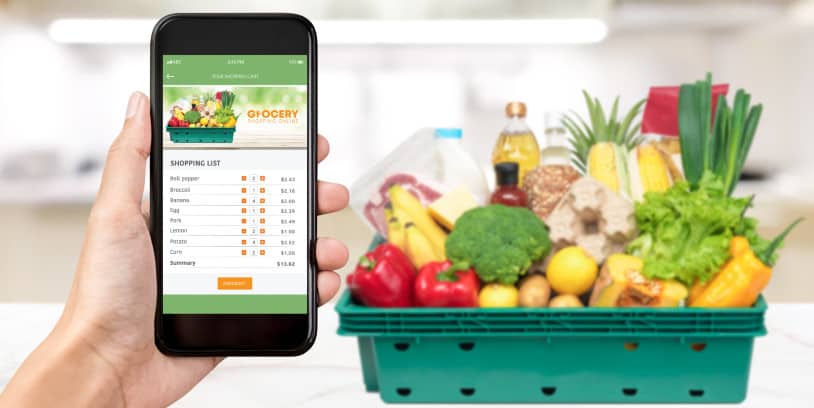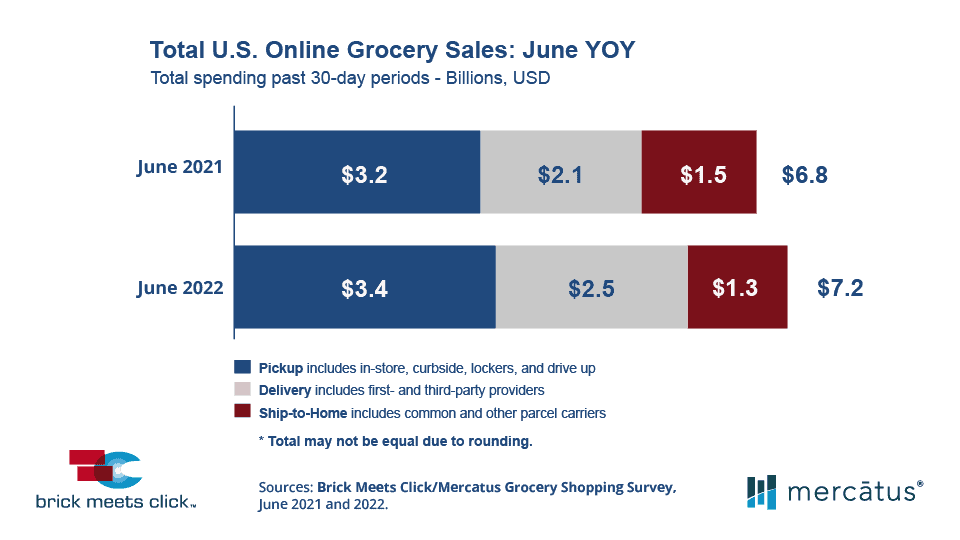Total U.S. online grocery sales in June climbed 6% year over year to $7.2 billion, and for the second quarter, eGrocery posted $22.4 billion in sales, a gain of 1% compared to 2Q 2021, according to the Brick Meets Click/Mercatus Grocery Shopping Survey fielded June 29-30, 2022.
While pickup, the largest segment of eGrocery, performed well, ship-to-home continues a long-term decline that started at the onset of the pandemic in March 2020 when online grocery shopping began to evolve rapidly to meet new needs.
“Inflation and COVID are creating cross-currents in the market as higher prices motivate customers to look for ways to avoid paying more than necessary, and ongoing concerns about contracting the virus motivate shoppers to use online grocery as a way to stay healthy,” said David Bishop, partner at Brick Meets Click. “This is especially true as new variants of the virus triggered surges in infection and rising illness rates during May and June.”
Pickup, the largest segment of eGrocery, performed well; its June and second-quarter sales rose 3%, respectively, versus a year ago. An expanding monthly active user (MAU) base and higher average order values (AOVs) were offset by lower order frequency among its MAUs during both periods.
For the second quarter of 2022, Pickup contributed 45.7% of total eGrocery sales, up 80 basis points versus 2021.
Delivery has benefited from a range of new service options and features that have enlarged the size of its addressable market and stimulated more usage occasions. Delivery’s monthly sales jumped over 20%, and it finished the quarter 6% higher than year-ago results.
Gains in the MAU base during both periods drove most of the sales lift, although higher AOVs also contributed to the year-over-year gains.
Delivery reported mixed results relative to order frequency as frequency increased during June but declined for the quarter. Delivery captured 34.2% of the online grocery dollar share for the second quarter, up 1.7 percentage points from 2021.
Related Article: La Bonita Brings eCommerce to Ethnic Shoppers in Las Vegas
Ship-to-Home continues a long-term decline that started at the onset of the pandemic in March 2020, when online grocery shopping began to evolve rapidly to meet new needs.
Year over year, Ship-to-Home sales fell over 14% in June and by more than 10% for the second quarter. While the segment’s MAU base grew over both periods, consistently lower AOVs drove the sales to decline along with a slight contraction in the number of orders placed each month.
Ship-to-Home dollar share for the quarter was 20.0%, down 2.6 percentage points versus last year.
During June, cross-shopping between Grocery and Mass declined to 27%, about 1.5 percentage points lower than last year, which may be attributed to fewer households shopping with Mass during the month.
During the second quarter, the share of Grocery’s MAU base that also shopped online with Mass came in at 28%, up slightly more than 1 percentage point compared to the second quarter of 2021.
The likelihood that an online grocery shopper will use the same service again within the next month remained steady at 63% for each month in the second quarter of 2022. As a result, this year’s second quarter average repeat intent rate climbed 7 points versus the same period a year ago.
For June 2022, the Grocery rate continued to trail Mass by 8 percentage points, underscoring the gap that grocers still need to close to protect their core customers.
“Despite the current inflationary environment, a significant number of grocery customers continue to shop using online channels,” said Sylvain Perrier, president and CEO of Mercatus. “Customers crave convenience but also want to find ways to save money. Encouraging customers to use lower-priced pickup services is one opportunity. Elevating and showcasing private label products online is another. Also, consider integrating digital coupons into your first-party web and mobile experiences.”
In terms of share of wallet, total eGrocery finished the quarter at 13.6%, up 1.5 percentage points versus last year. Excluding Ship-to-Home (since most conventional grocers don’t offer this service), Delivery and Pickup combined to contribute 10.9% during the second quarter, up from 9.3% last year.



